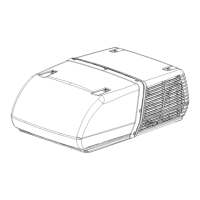2
I. GENERAL INFORMATION
OEM – Please make sure all documentation
accompanies the Heat Pump.
INSTALLER AND/OR DEALER – Please make sure
all documentation is presented to the product
consumer. The product consumer should also be
afforded the opportunity to purchase the OPTIONAL
THREE (3) YEAR PARTS REPLACEMENT
CONTRACT available from Airxcel, Inc.
For more information about the contract, please
review the sample contract located at
www.Airxcel.com. Use the application on the back of
the OPERATION AND MAINTENANCE
INSTRUCTIONS to apply for the extended parts
contract.
INQUIRIES ABOUT THE HEAT PUMP – Inquiries to
your Airxcel, Inc. representative or to Airxcel, Inc.
pertaining to product installation should contain both
the model and serial numbers of the roof top Heat
Pump. All roof top Heat Pump units have model and
serial number identification in two locations: (1)
Rating Plate sticker - may be viewed by looking
through the shroud louvers on the compressor side of
the roof top Heat Pump unit. The rating plate sticker
can be seen without removing the outer plastic
shroud, (2) Model/Serial number sticker (silver color) -
located on the return air flange on the rooftop unit
basepan. If the Heat Pump is installed, the sticker
may be viewed by lowering the ceiling assembly
shroud.
II. HEAT PUMP SIZING
Heat Pumps should be rated primarily by their ability
to cool. The ability of a Heat Pump to provide a
comfortable environment for the consumer is
dependent upon the following conditions.
The ability of a heat pump in the cooling mode to cool
a vehicle or maintain a consumer desired temperature
is dependent on the heat gain of the vehicle.
The physical size of the vehicle, the amount of window
area, the quality and amount of insulation, the position
exposure to sunlight, the number of people using the
vehicle and the outside temperature may increase the
heat gain to such an extent that the capacity of the
Heat Pump is exceeded.
As a rule, air supplied (discharge air) from the Heat
Pump will be 15 to 20 degrees cooler than the air
entering (return air) the ceiling assemblies bottom air
grilles.
For example, if the air entering the Heat Pump is 80°
(degrees F) - (return air), the supply air (discharge air)
into the vehicle will be 60° to 65° (degrees F). As long
as this temperature difference (15 to 20 degrees) is
being maintained by the Heat Pump, the Heat Pump
is operating properly.
Again, give careful consideration to the vehicle heat
gain variables. During extreme outdoor temperatures,
the heat gain of the vehicle may be reduced by:
• Parking the vehicle in a shaded area
• Keeping windows and doors closed
• Avoiding the use of heat producing appliances
• Using window shades (blinds and/or curtains)
For a more permanent solution to high heat gain
situations, additional vehicle insulation, window
awnings and/or window glass tinting should be
considered. A Heat Pump should not be considered
as a total replacement for a furnace. At ambient
temperatures below freezing, the Heat Pump will not
operate.
III. SELECTING AN INSTALLATION LOCATION
Your Airxcel, Inc. Heat Pump has been designed for
use primarily in recreational vehicles.
Is the roof of the vehicle capable of supporting both
the roof top unit and ceiling assembly without
additional support structures? Inspect the interior
ceiling mounting area to avoid interference with
existing structural members such as: bunks, curtains,
tracks, or room dividers. The depth of the ceiling
assembly shroud is 3”. Be sure to check clearance for
doors which must be swung open (refrigerator,
closets, cabinets).
Most of the time, roof mount Heat Pumps are installed
at existing roof vent locations. If there are, no roof
vents (existing mounting hole), the following
placement locations are recommended.
Motor Homes – a single unit or the forward of two
units should be mounted within 9 feet of the driver’s
compartment.
Travel Trailers or Mini-Homes – a location should be
selected that is near the door slightly forward of the
vehicle center length.
Vans – location should be in the center of the roof
(side to side – front to back).
Truck with Camper – location should be between 4
or 5 feet from the rear of the camper to achieve
maximum cooling effect.
IV. INSTALLING THE ROOF TOP UNIT
DANGER! SHOCK HAZARD DISCONNECT ALL
POWER TO THE VEHICLE BEFORE
PERFORMING ANY CUTTING TO THE VEHICLE.
CONTACT WITH HIGH VOLTAGE CAN RESULT
IN EQUIPMENT DAMAGE, PERSONAL INJURY
OR DEATH.
IMPORTANT
TO PREVENT DAMAGE TO THE WIRING AND
BATTERY, DISCONNECT THE BATTERY CABLE
FROM THE POSITIVE BATTERY TERMINAL
BEFORE PERMORMING ANY CUTTING TO THE
VEHICLE.
This Heat Pump is to be installed in accordance with
NFPA Standard 501C.
If the Heat Pump is being installed on a low friction
roof surface such as aluminum, steel or gelcoat
fiberglass, it is advisable to order a spring pad kit, part
number 8333-3871 to add “spring pads” to maintain
bolt tension and retard lateral motion of the Heat
Pump which could shear the mounting bolts.
If the Heat Pump is being installed subject to heavy
lateral loads, it is advisable to order a “Roughneck”
gasket/bolt package, part number 48207-3301 to
maintain bolt tension, prevent lateral movement of the
Heat Pump and guard against bolt shear.
Once the location for your Heat Pump has been
determined (See Section III), a reinforced and framed
roof hole opening must be provided (may use existing
roof vent opening). Before cutting into the vehicle roof,
verify that the cutting action will clear all structural
members and crossbeams. Additionally, the location
of any inner roof plumbing and electrical supplies must
be considered.
A. If a roof vent is already present in the desired
mounting location for the Heat Pump, the following
steps must be taken:
1. Remove all screws which secure the roof vent
to the vehicle. Remove the vent and any
additional trim materials. Carefully remove all

